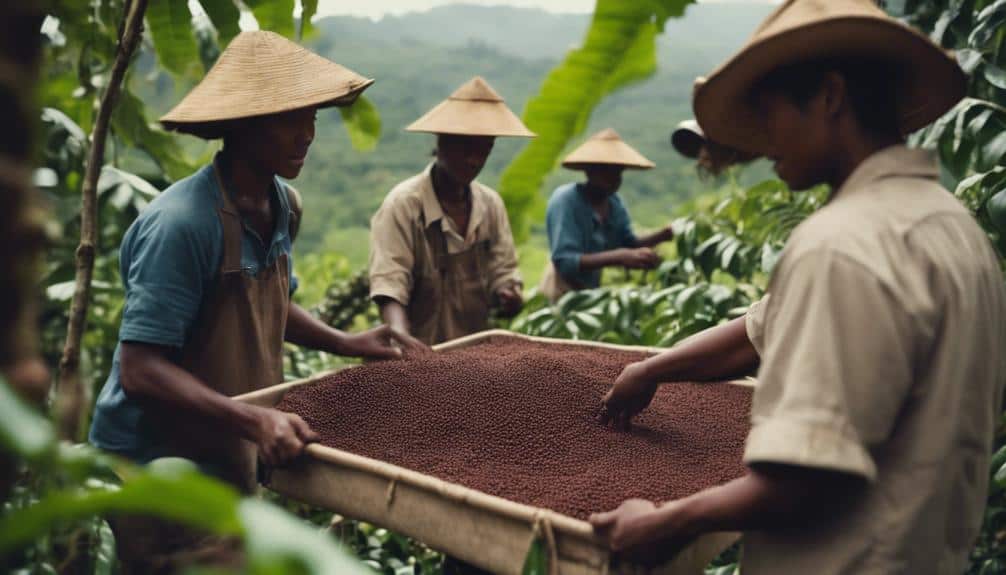5 Fascinating Facts About Dung Coffee Beans

As a coffee enthusiast, I stumbled upon some intriguing information about dung coffee beans that shed light on the unique world of coffee. The process through which these beans undergo fermentation within animal digestive systems offers a fascinating twist to traditional coffee production methods. The resulting flavor profiles are an exquisite blend of earthy, chocolatey, citrusy, and floral notes that set them apart from your average brew. However, there's more to these beans than just their taste. Stay tuned to discover some surprising facts that make dung coffee beans a topic worth exploring further.
The Origin of Dung Coffee Beans
Undoubtedly, the origin of dung coffee beans lies in the fascinating digestive journey of various animals like civet cats, elephants, monkeys, and birds. Elephant dung, among others, plays a vital role in this unique coffee production process. As these animals consume ripe coffee cherries, the beans pass through their digestive systems. Here, digestive enzymes break down the proteins in the beans, altering their chemical composition. This fermentation process is what gives dung coffee beans their unique taste.
The use of animal feces in coffee production raises valid concerns about animal welfare. It's vital to make sure that these animals are treated ethically and not harmed in any way during the collection of the dung. Moreover, the workers involved in gathering and processing the beans must also be fairly compensated for their labor. Balancing the desire for this distinctive coffee flavor with ethical considerations is key in the production of dung coffee beans.
Unique Fermentation Process
During the essential fermentation process of dung coffee beans inside the digestive systems of elephants or civet cats, a remarkable transformation occurs, enhancing the coffee's flavor complexity and removing bitterness. This process is vital in developing the distinctive characteristics that make dung coffee beans so sought after by coffee connoisseurs.
- Natural Fermentation: The natural fermentation that takes place in the dung coffee beans as they pass through the digestive tracts of elephants or civet cats is what sets this coffee apart. It allows for the breakdown of proteins and sugars, leading to a smoother taste.
- Enhanced Flavor Profiles: The fermentation process not only removes bitterness but also enhances the flavor complexity of the coffee beans. This results in a rich and nuanced taste that's highly prized in the world of specialty coffee.
- Unique Aroma and Taste: As a result of this fermentation, dung coffee beans acquire unique aroma and taste characteristics that can't be replicated through traditional coffee processing methods. The end product is a cup of coffee that offers a truly exceptional sensory experience.
Exquisite Flavor Profile

With their origins rooted in the unique digestive processes of animals like elephants and civet cats, dung coffee beans boast an exquisite flavor profile that sets them apart from traditional coffees. The fermentation that occurs within the digestive tracts of these animals imparts complex flavors to the beans, including earthy, chocolate, citrus, and floral notes.
Kopi Luwak coffee, sourced from civet cats, is renowned for its smooth texture and the absence of a high acidity aftertaste, making it a favorite among coffee connoisseurs. On the other hand, Black Ivory Coffee, produced by elephants, offers a distinct taste with hints of cherry and a soft tea-like quality.
These animal-derived coffees, like dung coffee beans, cater to those seeking rare and exclusive taste experiences in the world of coffee. The unique journey these beans undertake through the digestive systems of animals results in a flavor profile that's truly exceptional and unparalleled.
Ethical Concerns and Controversies
The unique process involving animal digestion in the production of dung coffee beans raises ethical concerns and controversies surrounding the treatment of animals and humans in this industry. When it comes to Kopi Luwak or civet coffee, here are some significant points to take into account:
- Ensuring Animal Welfare: Proper care for the civet cats involved in the process is essential to maintain ethical standards. Monitoring their well-being and living conditions is important to uphold animal welfare throughout the production of dung coffee.
- Impact on Brand Integrity: Controversies may arise if the treatment of animals and humans in the industry isn't aligned with ethical standards. Maintaining brand integrity is directly linked to how animals and workers are treated during the production of this expensive and unique coffee.
- Ethical Standards: Upholding ethical practices in dung coffee production is essential to address concerns about animal welfare and human involvement. Working towards meeting high ethical standards can help mitigate controversies and ensure a more sustainable and responsible industry.
Price and Rarity

Fascinatingly rare and exquisitely expensive, dung coffee beans like Kopi Luwak and Black Ivory Coffee captivate the world with their unique production process. Kopi Luwak, known as 'Cat Poop Coffee,' can fetch up to $700 per pound, making it one of the world's most expensive coffees. Similarly, Black Ivory Coffee, which comes from elephants' dung, sells for around $500 per pound, appealing to a niche market of luxury consumers.
The high price tag attached to these coffee beans is a direct result of their limited production capacity and labor-intensive methods required for their creation. The exclusivity of these beans contributes to their rarity and coveted status among coffee aficionados. The specialized processes involved in harvesting and processing dung coffee beans further add to their expensive nature.
When savoring a cup of dung coffee, one not only indulges in a unique and luxurious experience but also supports a craft that pushes the boundaries of traditional coffee production.
Conclusion
To sum up, dung coffee beans offer a truly unique and luxurious coffee experience, with their origins, fermentation process, flavor profile, controversies, and high price tags all adding to their mystique.
Despite ethical concerns, the rarity and exclusivity of these beans continue to fascinate coffee enthusiasts worldwide.
The next time you sip on a cup of dung coffee, remember the intricate journey these beans have taken to reach your mug, and savor every sip of their complex and unforgettable flavors.
Cheers to the world of dung coffee beans!





